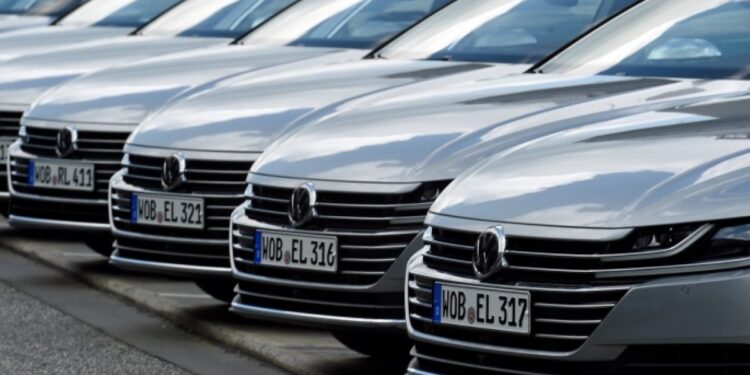10/4/2024–|Last updated: 10/4/202408:55 PM (Mecca time)
German automakers criticized the European Commission’s decision on Friday to impose additional customs duties of 35.5% on electric cars manufactured in China starting next November, amid warning of a trade war.
The European Commission voted by a majority of its members today, Friday, on the decision to raise customs duties on Chinese electric cars to 45% from the current 10%.
Brands such as Volkswagen, BMW, and Mercedes – which criticized the decision – invest heavily in the Chinese market and sell a large portion of their production in this market.
Volkswagen said in a statement, “We appeal to the European Commission and the Chinese government to continue the ongoing negotiations to reach a constructive political solution.”
“The common goal must be to prevent any protectionist tariffs and thus avoid the outbreak of a trade conflict,” she added.
Volkswagen added, “The tariffs are considered a wrong approach and will not improve competitiveness in the European automobile industry.”
For its part, BMW luxury car company warned of the negative repercussions of imposing protectionist duties on Chinese electric cars, and said, “Today’s vote is a fateful signal for the European automobile industry.”
She added, “A quick solution is now required between the European Commission and China to prevent the outbreak of a trade dispute, which would be a loss for everyone.”
Hildegard Mueller, head of the German Automotive Industry Association, said in a statement that the decision to impose fees is “another step away from global cooperation,” adding that its potential losses will be greater than any benefits.
Mueller called on the European and Chinese sides to negotiate to avoid escalation and the outbreak of a trade conflict.
Germany, which voted against the plan, is calling for more talks with Beijing amid fears of retaliatory trade measures from China that could hurt Germany’s large auto industry.
German Finance Minister Christian Lindner warned of the escalation of trade disputes, stressing in a statement on the social networking site X that the European Commission should not ignite a trade war, “We need a negotiated solution.”
Before the decision, Hungarian Prime Minister Viktor Orban warned on Friday that the European Union was heading toward a “cold economic war” with China, referring to customs duties on Chinese electric cars.
Hungary has become an important trade and investment partner for China during Orban’s term, in contrast to some other countries in the European Union that are considering becoming less dependent on the world’s second largest economy.
Chinese opposition
For its part, China expressed its strong rejection of the European decision, and criticized the European bloc’s practices in the “anti-subsidy” case against Chinese vehicles, describing it as “protective, unfair and unreasonable,” in a comment made by a spokesman for the Chinese Ministry of Commerce today.
Details of the European decision
- The European Commission said in a statement today that its decision to raise customs duties on Chinese cars is effective for a period of 5 years, starting from the end of this October.
- The European Union believes that the Chinese government supports the country’s electric vehicle industry, which is contrary to fair competition and cross-border trade.
- China has denied on more than one occasion any support it provides to electric car manufacturers in the country.
- China threatened earlier that any European decision to raise duties would be matched by a Chinese decision on imports coming from the bloc.
- 10 European countries voted on the decision to raise customs duties, including Italy and France.
- Five countries rejected the decision, including Germany and Hungary.
- 12 countries abstained from voting.



